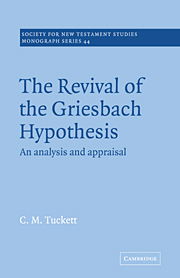Book contents
- Frontmatter
- Contents
- Acknowledgements
- Note on Abbreviations
- Introduction
- Part I Some Aspects of the History of the Study of the Synoptic Problem
- Part II General Phenomena
- Part III Some Particular Texts
- SECTION A SELECTED MARKAN PASSAGES: Introduction
- 9 The Healing of the Man with the Withered Hand
- 10 The Synoptic Tradition on Uncleanness
- 11 The Cleansing of the Temple
- 12 Tribute to Caesar
- 13 The Double Commandment of Love
- 14 The Woes against the Scribes and Pharisees
- 15 The Widow's Mites
- SECTION B THE DOUBLE TRADITION: Introduction
- 16 Wisdom Motifs in the Double Tradition
- 17 The Apocalyptic Discourses
- Conclusion
- Appendix
- Notes
- Abbreviations
- Bibliography
- Index
SECTION A SELECTED MARKAN PASSAGES: Introduction
from Part III - Some Particular Texts
Published online by Cambridge University Press: 18 January 2010
- Frontmatter
- Contents
- Acknowledgements
- Note on Abbreviations
- Introduction
- Part I Some Aspects of the History of the Study of the Synoptic Problem
- Part II General Phenomena
- Part III Some Particular Texts
- SECTION A SELECTED MARKAN PASSAGES: Introduction
- 9 The Healing of the Man with the Withered Hand
- 10 The Synoptic Tradition on Uncleanness
- 11 The Cleansing of the Temple
- 12 Tribute to Caesar
- 13 The Double Commandment of Love
- 14 The Woes against the Scribes and Pharisees
- 15 The Widow's Mites
- SECTION B THE DOUBLE TRADITION: Introduction
- 16 Wisdom Motifs in the Double Tradition
- 17 The Apocalyptic Discourses
- Conclusion
- Appendix
- Notes
- Abbreviations
- Bibliography
- Index
Summary
One of Farmer's fundamental criticisms of Streeter's treatment of the minor agreements is that Streeter divided the agreements into categories, and found a different explanation for each one. The danger of this method is that one might miss the possibility of a whole ‘web’ of agreements occurring in a single pericope.
So far I have discussed the evidence in a similar ‘atomising’ way. With the possible exception of the discussion of the Mark-Q overlaps, the phenomena have been considered within the context of similar examples within the gospel tradition. Farmer's criticisms of Streeter demand that one also look at the phenomena within the context of the pericopes in which they occur. Thus it is right that one should examine various individual pericopes within the gospels to see which hypothesis can best explain the texts. Again, some sort of criterion of ‘coherence’ must be applied, for any hypothesis can give some explanation of the changes made. What is required is to see if one hypothesis gives a better, more consistent explanation of the redaction involved for the secondary writer(s). In the first section of this part of the study, various passages from Mark's gospel with their synoptic parallels will be examined in detail, with the opposing theories of Markan priority and the GH about the relative position of Mark in mind. In the second section, an attempt will be made to examine some of the ‘double tradition’ passages, bearing in mind the competing theories of the ‘Q’ hypothesis and the GH.
- Type
- Chapter
- Information
- Revival Griesbach Hypothes , pp. 95Publisher: Cambridge University PressPrint publication year: 1983

